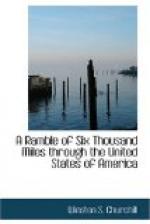We crossed the Big-Miami river, and proceeded by a tolerable road, and some good farms, to Lawrenceburg, a handsome town on the Ohio, within a mile of the outlet of the Miami. From thence we drove on towards Wilmington; but our horse becoming jaded, we found it expedient to “camp out,” within some miles of that town. Next morning we passed through Wilmington, but lost the direct track through the forest, and took the road to Versailles, which lay in a more northerly direction than the route we had proposed to ourselves. This road was one of those newly cut through the forest, and there frequently occurred intervals of five or six miles between the settlements; and of the road itself, a tolerably correct idea may be formed by noting the stipulations made with the contractors, which are solely that the roads shall be of a certain width, and that no stump shall be left projecting more than fifteen inches above the ground.
On the night of the second day we reached the vicinity of Versailles, and put up at the residence of a backwoodsman—a fine looking fellow, with a particularly ugly squaw. He had come from Kentucky five years before—sat down in the forest—“built him” a log-house—wielded his axe to the tune of “The Hunters of Kentucky,” and had now eighteen acres of cleared land, and all the et ceteras of a farm. We supped off venison-steaks and stewed squirrel. Our host told us that there was “a pretty smart chance of deer” in the neighbourhood, and that when he first “located,” “there was a small sprinkling of baar” (bear), but that at present nothing of the kind was to be seen. There was very little comfort in the appearance of this establishment; yet the good dame had a side-saddle, hung on a peg in one of the apartments, which would not have disgraced the lady of an Irish squireen. This appears to be an article of great moment in the estimation of West-country ladies, and when nothing else about the house is even tolerable, the side-saddle is of the most fashionable pattern.
From Versailles, we took the track to Vernon, through a rugged and swampy road, it having rained the night before. The country is hilly, and interspersed with runs, which are crossed with some difficulty, the descents and ascents being very considerable. The stumps, “corduroys” (rails laid horizontally across the road where the ground is marshy) swamps, and “republicans,” (projecting roots of trees, so called from the stubborn tenacity with which they adhere to the ground, it being almost impossible to grub them up), rendered the difficulty of traversing this forest so great, that notwithstanding our utmost exertions we were unable to make more than sixteen miles from sunrise to sunset, when, both the horse and ourselves being completely exhausted, we halted until morning. I was awoke at sunrise by a “white-billed woodpecker,” which was making the woods ring by the rattling of its bill against a tree. This is a large handsome bird, (the picus principalis of Linnaeus), it is sometimes called here the wood-cock. Pigeons, squirrels, and turtle-doves abound in all these forests, and my friend being an expert gunner, we had always plenty of game for dinner. The morning was still grey when we set forward.




